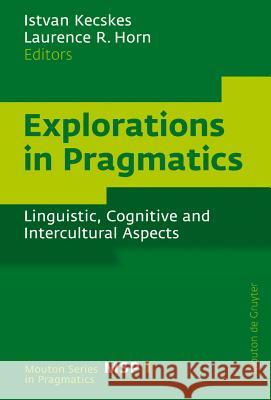Explorations in Pragmatics » książka
Explorations in Pragmatics
ISBN-13: 9783110193664 / Angielski / Twarda / 2007 / 354 str.
The papers in this volume reflect current trends in international research in pragmatics over recent years. The unique feature of the book is that the authors coming from ten different countries represent all aspects of pragmatics and address issues that have emerged as the result of recent research in pragmatics proper and neighboring fields such as cognitive psychology, philosophy, and communication. Recent theoretical work on the semantics/pragmatics interface, empirical work within cognitive and developmental psychology, intercultural communication and bilingual pragmatics have directed attention to issues that warrant reexamination and revision of some of the central tenets and claims of the field of pragmatics. In addition, cultural changes originating from globalization have affected the relation of language to the wider world. In particular, the spread of English as a global language has led to the emergence of issues of usage, power, and control that must be dealt with in a comprehensive pragmatics of language. Pragmatic theories have traditionally emphasized the importance of intention, rationality, cooperation, common ground, mutual knowledge, relevance, and commitment in the formation and execution of communicative acts. The new approaches to pragmatic research reflected in this volume, while not questioning the central role of these factors, extend the purview of the discipline to allow for a more comprehensive picture of their functioning and interrelationship within the dynamics of communication. The papers address these issues from a variety of directions. In Part I, Searle and Horn examine language use and pragmatics from a philosophical perspective. In Part II, the cognitive aspect of pragmatics is represented in the papers of Moeschler, Ruiz de Mendoza & Baicchi, and Giora. They focus on well-known domains such as illocutionary











